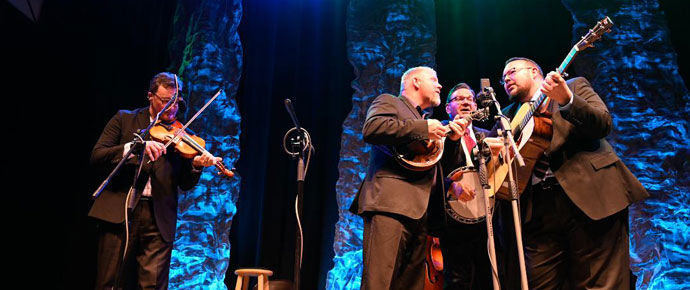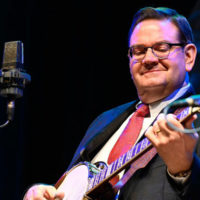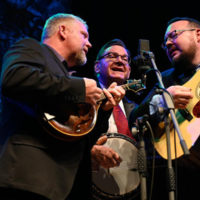
Ohio-based banjo player Joe Mullins, leader of the Radio Ramblers, has been playing bluegrass virtually his entire life. His list of achievements—including multiple IBMA and SPBGMA awards, playing virtually every major festival in the country and hosting a syndicated weekly radio show—are a reflection of the hard work and dedication that has driven him to succeed in this business. We caught up with Joe for a few words while the Radio Ramblers were playing the California Bluegrass Association’s 2019 Fathers Day Festival.
Thanks Joe for taking the time to share your story. You’re from Ohio but your dad, Paul “Moon” Mullins, was a great Kentucky fiddler and well-known Ohio Valley radio personality.
I was born in Middletown, Ohio. My dad came to WPFB Radio there in 1964, and I was born in ‘65. Grew up there. I bought the local radio station in Xenia, Ohio in 1995, the first in the regional network I manage known as Real Roots Radio.
The Cincinnati and Dayton areas have a rich bluegrass history. How would you contrast that to the music from Kentucky?
The Appalachian migration put Kentuckians into Ohio by the thousands after World War II. So many neighborhoods in southwest Ohio are made up of folks who still call Kentucky—and whatever county they were born in—home. The music from Appalachia played in bars, at festivals, or in churches really came of age and created an audience outside of Kentucky in my region of Ohio.
Do all the great fiddlers come from Kentucky?
Many but not all. Great Kentucky fiddlers include Kenny Baker, Art Stamper, Jason Carter, and my dad. But the Carolinas also produced greats—Bobby Hicks, Chubby Anthony, and more— and Florida gets credit for Chubby Wise, Vassar Clements, Aubrey Haney, and Jason Barie.
You’re like the king of bluegrass media with the radio stations, festivals, and what not. How do you keep all those activities going?
I’m blessed to have talented, dedicated team members who work very hard. I have a veteran staff with my radio network who do fantastic work with our audience and advertisers. JMRR has a great team supporting us, and our families all assist too.
You’re also on the IBMA board. What’s new and exciting for the upcoming 2019 World of Bluegrass in Raleigh?
An outstanding business conference is planned. Registrations are up, and the networking and educational opportunities at the conference are growing. Same for the Wide Open Bluegrass festival throughout the streets of Raleigh, with 200 bands and over 200,000 people. The festival is growing while still providing an up-close experience for all ages!
Have you ever done anything professionally not related to music?
Not much. Mostly broadcasting, performing, recording, and event promotion. I worked a few construction jobs when I was a teenager and learned some cabinet making skills, but I was scared of hurting my hands and didn’t advance.
Is For the Record the first release that you’ve produced? How do you come up the arrangements?
I’ve been the producer on all the JMRR recordings along with a lot of quality input from the band and skilled engineers. I love the relentless pursuit of good material that works for our band. Hearing an arrangement sometimes happens as soon as we identify a song we want to record. We’re so blessed with vocal variety and versatility that most arrangements start with deciding how the song sounds best vocally. Many songs on the past two albums were arranged by the guys in the band, not me. Mike Terry completely arranged Dreamers Hill on the new CD. Jason Barie arranged Fiddle Man’s Delight on the last album. Our sound is not all about me. Everyone contributes a lot of talent and energy.
For the Record has a little bit of everything—hard driving bluegrass, old school country, Gospel—all with perfect harmonies. Have you been tempted to stray from that formula?
Not really, but a little bit of everything with an identifiable sound is the goal. It’s my hope that we’re recognizable when one of our songs comes on the radio, and that we sound refreshing. I’m very selective on material and dig through many sources. I’m very thankful that some of the top writers in bluegrass got great songs to us for the past three CDs .
Tell us about the making of The Guitar Song with Del McCoury. I read that you spent the day with him, but surely it didn’t take that long to cut the track.
It was such an enjoyable day! The recording process wasn’t all day but we added in a little storytelling and a few cups of coffee. I told Del about the song early last year and gave him my ideas for it, and he was all in. I made a rough demo, solo, and gave it to him a few weeks out. We got started at Skaggs Studio late morning. Del came in and we visited a while and he said “Now I’ve not rehearsed this very much,” and I told him, “You just be Del McCoury!” He told a lot of great stories about his guitars and really got into character. We loved all the guitar runs he pumped into the last part of the song. He’s a great mentor and such an encouragement.
Your song O-hio reminds me of the song Highway 52 by the late Dave Evans from southern Ohio. His voice and banjo were mighty powerful but he lived a tough life. Did you ever rub shoulders with him?
Yes, I saw Dave a lot when I was younger. When I was with the Traditional Grass in the ‘80s and early ‘90s, we did a lot of shows and festivals with Dave. He could really sing and loved to perform. His songwriting was powerful. JMRR recorded one of his songs in 2012, When the Snow Falls On My Foggy Mountain Home.
The band Longview had some greats who went on to their own successful careers. Might you ever do something with those guys again?
Longview was an exciting collaboration and it was a thrill to see those recordings find success. But with James King gone too soon, I don’t know if we’ll ever assemble again. Thankfully, I’m still great friends with all those guys. Dudley Connell and Marshall Wilborn were in the studio on the album I did with Junior Sisk.
This is going back a bit but one of my favorite songs is The Blues Are Still The Blues from the Traditional Grass with you and your father, Paul “Moon” Mullins. What was it like playing with your father as a teenager?
Well I’m certainly thankful for those years and the great foundation I had learning alongside my dad. I had access to all the great recordings throughout bluegrass history, and was family friends with many of the great first generation founders. Performing with dad prepared me for the radio career and for leading a band. I’m now the age he was when The Traditional Grass was our busiest in the early ‘90s, so a lot of memories come to mind when I’m on the road.
I saw you played Bean Blossom Bluegrass Festival this year. Do you have memories of the first time you played there?
Absolutely! The Bean Blossom festival in September of 1982 was my first time there. Dad and Bill Monroe were great friends. He booked just the two of us as a duet for the weekend, and Dad was the stage manager and emcee. I was 16, a senior in high school, and it was one of the first big festivals I played. I still have a festival poster that I took from the wall of the old Brown County Jamboree barn that was on the property back then.
Your band’s harmonies are seamless. How do you make them sound like a single voice, other than years of playing together?
The years have helped, and we rehearse the vocals strenuously. Not just on pitch, but phrasing and a smooth blend. I’m a huge Osborne Brothers fan and that sound is burned in my brain. When I was a kid, and dad worked with The Boys from Indiana, their trio was powerful. I think Mike Terry, our mandolin man and a great harmony singer, is a great component to our harmonies. He’s got a tone and ability to make the blend have a distinct quality. We enjoy singing around a single microphone and try to be consistent in how we present each song at every show.
I love that song hard driving Long Gone Out West Blues from The Story We Tell, have you toured much out west and how does it differ from east of the Mississippi?
We’re fortunate that we’ve played most every segment of North America. Thankfully we’ve created a fan base in some valuable markets in the east, like Virginia, the Carolinas and of course, Ohio. But I also love the audiences out west, Colorado, Montana, and California especially. I suppose it’s easy for me as a performer to get excited when I find diverse crowds who appreciate our music. What we present is part of the culture in many parts of the country. But not so much elsewhere, and to have audiences enjoy a great first experience with our music is really rewarding. We’ve enjoyed Canadian tours too and we’re headed to Ireland and England again this year – can’t wait!
You have a great instrumentalist and fiddler in Jason Barie. Why don’t we hear more fiddle tunes on the releases?
Jason is fantastic for sure. And just in time, he just finished a new album that includes several new fiddle tunes that we’ll be featuring in our shows. His new CD will be on Billy Blue Records and includes about 20 all-star guests. JMRR will have it on the road with us before Labor Day this year.
Have you played the CBA Fathers Day Festival before this year?
I played it with The Traditional Grass in 1994 and with Longview in either 1999 or 2000.
Are people from your neck of the woods aware of the early California greats such as Rose Maddox, Vern Williams, Vern and Ray?
Some have done their homework and know about the California bluegrass history. Thankfully, great California grassers like Laurie Lewis, Keith Little, Kathy Kallick, and Frank Solivan keep reminding us and creating great new music.
What was your experience playing the Fathers Day Festival? Were there any surprises?
It was perfectly organized, as always. The CBA has such a vibrant membership and such a dedicated team of leaders and volunteers. It’s thrilling to see a full campground with jamming of ever type and style, and plenty of youngsters and families. I was so glad the audience really enjoyed our all Gospel set on Sunday. And thanks to the great California fans, we sold out of our Gospel CDs and almost all of the others. We’d love to return, soon!
Websites
Notes
Copy editing by Jeanie Poling. Photographs by Alan Bond.









